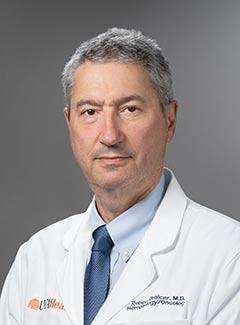
Genitourinary cancers — including prostate, bladder, and kidney cancers — represent some of the most common and complex malignancies providers encounter. R. Dreicer, MD, is deputy director of UVA Health Comprehensive Cancer Center. A nationally recognized genitourinary medical oncologist, he focuses on bringing the latest research and treatments into everyday patient care.
For Dreicer, oncology has always been about both science and people. He was first drawn to the field by academic mentors in radiation biology and oncology, and has built his career on advancing treatment while supporting patients and their families through difficult decisions.
In this Q&A, Dreicer shares his perspective on collaboration, timely diagnosis, and how providers can help patients navigate the complexities of cancer care.
How can providers support timely diagnosis and treatment?
Many patients share concerns about the time it takes to complete critical testing. While delays are sometimes unavoidable, it often comes down to making sure referrals for procedures or imaging are given the correct priority — and that patients know to call about cancellations when needed. These small steps can make a big difference in getting patients the care they need faster.
Which risk factors should providers keep in mind?
It’s very disease-specific. But in general, patients with known or suspected genetic syndromes, such as Lynch syndrome, should have tailored screening recommendations.
What’s something you wish more providers knew about genitourinary oncology?
Access to urology can be challenging given our aging population and the limited number of specialists. Patients with suspected urologic cancers can often start with medical oncology, and we can help coordinate timely referral to our urology colleagues when needed.
When should providers reach out to your program?
If there’s any concern, please contact us. My colleagues and I are happy to provide curbside consultations by phone or email to help sort out patient challenges.
What’s your approach to collaborating with referring providers?
Communication is the priority. Our patients depend on their physicians, and providers need timely updates about the status of their patient’s management.
What sets UVA Health apart for cancer care?
I’m fortunate to work with outstanding colleagues, and patients consistently comment on the quality and character of the people they meet here. Beyond that, it’s about access — faster scheduling for our clinics, and even something as practical as hassle-free parking, which patients greatly appreciate.